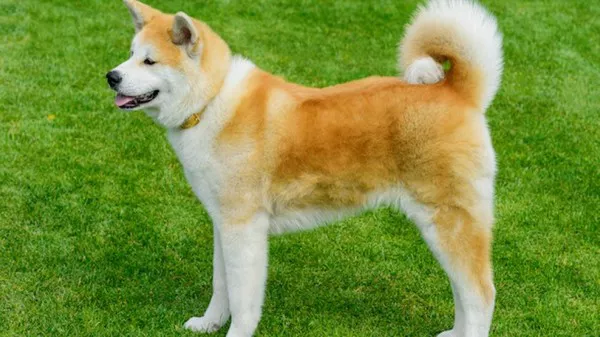Overview of the Akita Breed:
The Akita, a majestic and powerful breed originating from Japan, has captured the hearts of dog enthusiasts worldwide. Known for their loyalty, strength, and striking appearance, Akitas have a rich history dating back centuries. Originally bred for hunting large game such as wild boar, deer, and even bears, Akitas evolved into versatile working dogs and cherished companions. Their distinct appearance, characterized by a broad head, small triangular eyes, and a curled tail, sets them apart in the canine world.
Temperament Traits:
When considering adding an Akita puppy to your family, understanding their temperament is crucial. Akitas are renowned for their calm and composed demeanor, particularly in adulthood. However, it’s essential to recognize that temperament can vary among individual dogs, influenced by genetics, early socialization, and training.
As puppies, Akitas exhibit a mix of characteristics typical of their breed. While they may display energy and curiosity, they also demonstrate a surprising level of tranquility compared to other breeds of similar size. Akita puppies are known for their independent nature, which can sometimes be mistaken for aloofness. However, with proper socialization and positive reinforcement training, they can develop into well-adjusted and affectionate companions.
Energy Levels and Activity Requirements:
Despite their calm demeanor, Akita puppies have moderate to high energy levels, requiring regular exercise to keep them mentally and physically stimulated. Daily walks, playtime, and interactive games are essential to prevent boredom and unwanted behaviors such as excessive barking or destructive chewing.
It’s important to note that Akitas are not hyperactive dogs that demand constant activity. Instead, they appreciate structured exercise sessions that allow them to explore their surroundings and engage in activities that stimulate their natural instincts. Providing ample opportunities for exercise will contribute to a balanced and contented Akita puppy.
Socialization and Training:
Early socialization is paramount for Akita puppies to develop into well-behaved and confident adults. Introducing them to various people, animals, and environments from a young age helps prevent shyness, fearfulness, and aggression. Positive experiences during socialization lay the foundation for a calm and well-adjusted temperament in adulthood.
Training is equally essential for shaping an Akita’s behavior. While they are intelligent and eager to please, Akitas can also be strong-willed and independent, requiring firm yet gentle guidance. Consistent training methods based on positive reinforcement techniques yield the best results, fostering a strong bond between owner and dog while promoting desired behaviors.
Behavioral Tendencies:
Akitas are inherently protective of their families and territories, a trait deeply ingrained in their history as guardians and hunters. While this protective instinct is admirable, it can sometimes manifest as aggression towards unfamiliar people or animals if not properly managed.
Early socialization and training are essential for Akitas to differentiate between friend and foe, ensuring that their protective instincts are appropriately directed. Owners must provide clear boundaries and consistent leadership to prevent unwanted behaviors while still allowing their Akita to fulfill its role as a loyal and protective companion.
Environment Suitability:
Creating a suitable environment for an Akita puppy involves more than just providing food and shelter. Akitas thrive in homes where they feel safe, secure, and respected as members of the family. A calm and predictable routine, along with a designated space for rest and relaxation, helps foster a sense of stability and tranquility for these sensitive yet stoic dogs.
Additionally, providing mental stimulation through interactive toys, puzzle feeders, and training sessions prevents boredom and destructive behaviors. A peaceful environment combined with ample mental and physical exercise contributes to the overall well-being and calmness of an Akita puppy.
Owner Responsibilities:
Owning an Akita puppy is a significant responsibility that requires commitment, patience, and understanding of the breed’s unique characteristics. Potential owners must be prepared to invest time and effort into proper socialization, training, and care to ensure their Akita grows into a well-adjusted and balanced adult dog.
Regular veterinary care, proper nutrition, and grooming are essential aspects of responsible Akita ownership. Additionally, owners must be prepared to provide ongoing mental and physical stimulation to meet their puppy’s needs and prevent behavioral issues.
Health Considerations:
While Akitas are generally healthy dogs, like all breeds, they are prone to certain health issues that can impact their temperament and overall well-being. Hip dysplasia, progressive retinal atrophy (PRA), and autoimmune disorders are among the health conditions that may affect Akitas.
Regular veterinary check-ups, a nutritious diet, and appropriate exercise can help mitigate the risk of health problems and ensure the longevity of your Akita’s calm and contented nature.
Real Owner Experiences:
To gain a deeper understanding of the temperament and behavior of Akita puppies, it’s valuable to hear from real owners who have firsthand experience with the breed.
“I was initially drawn to the Akita breed because of their majestic appearance, but I quickly fell in love with their calm and loyal nature,” says Sarah, a proud Akita owner. “My Akita puppy, Kumo, has been a joy to raise. He’s incredibly intelligent and has a quiet confidence about him that’s truly remarkable.”
Expert Opinions:
Veterinarians and professional dog trainers offer valuable insights into the care and behavior of Akita puppies.
Dr. Emily Carter, a veterinarian specializing in canine behavior, emphasizes the importance of early socialization for Akitas. “Akitas are naturally reserved dogs, so it’s crucial to expose them to a variety of people, animals, and environments during their critical socialization period,” says Dr. Carter. “Positive experiences during this time will help shape their temperament and prevent behavioral issues down the road.”
In conclusion, while Akita puppies are known for their calm and composed demeanor, their temperament is influenced by genetics, socialization, and training. Providing a nurturing environment, consistent training, and proper healthcare are essential for raising a well-behaved and balanced Akita companion. With the right care and guidance, Akita puppies can grow into loyal, loving, and calm adult dogs, bringing joy and companionship to their families for years to come.
Related Topics:

























